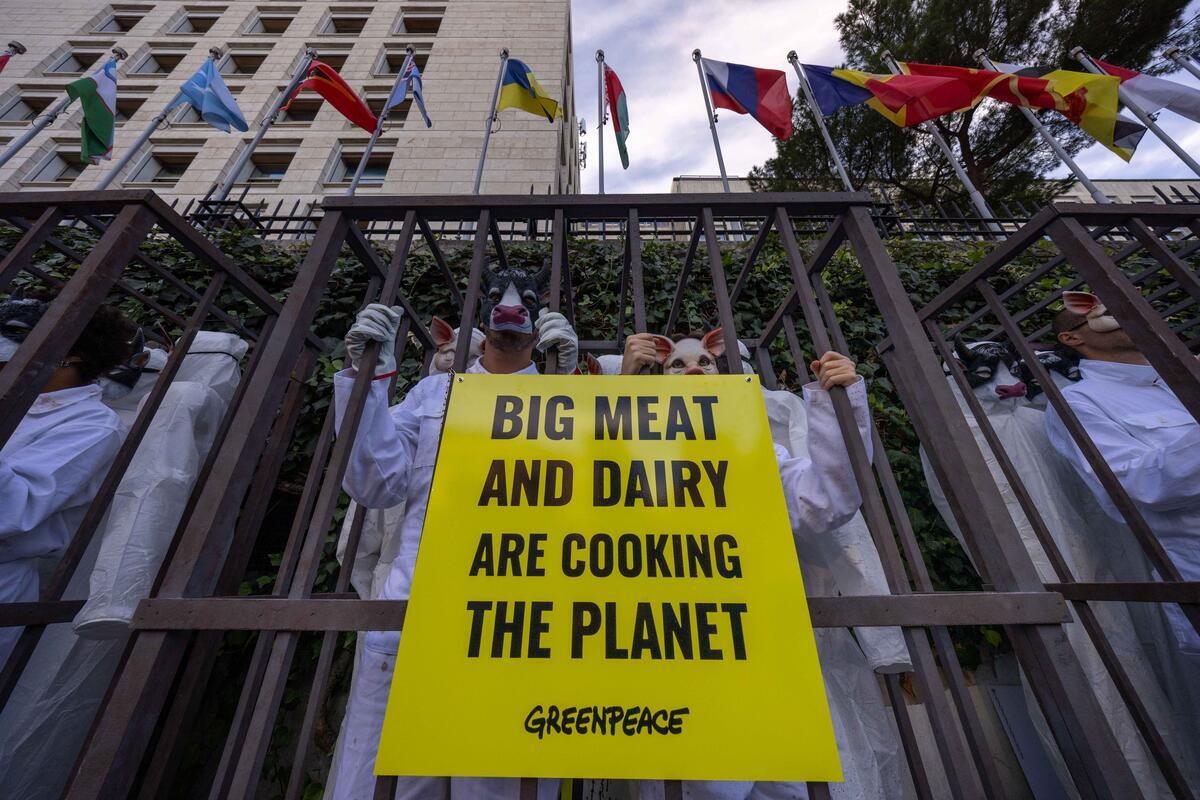Alongside a few of my Greenpeace colleagues, I will be in Brazil at COP30 this year, where world leaders are tasked with ramping up climate ambition so that our planet can stay liveable. We will be there to make sure they act in the people and planet’s best interest, with ambition, courage, and climate justice.
But it’s not just climate experts there. Lobbyists will be there too. But not just your regular ‘Big Oil’ lobbyist. Because COP30 will be in the Brazilian Amazon, we expect an even bigger presence from the livestock sector – including the world’s largest meat company, JBS, notorious for its links to deforestation and livestock expansion into pristine ecosystems like the Amazon Rainforest.
Agriculture is one of the biggest drivers of climate change, and the livestock industry in particular is the largest single source of human-made methane emissions globally. But “Big Ag” companies will be present at the COP to downplay their harmful impact – and to fool policymakers and COP attendees into believing that they are the solution to climate breakdown.
Methane: The superheating gas driving global heating
Methane is a powerful greenhouse gas – 80 times stronger than CO₂ over a 20-year period.
Methane is responsible for nearly a third of global warming to date. And it’s rising fast. According to the Global Methane Budget, livestock-related methane emissions increased by 12.5% between the 2000s and 2020 due to more production (and consumption) of farmed animals.
Yet, recent studies find that fewer than 4% of climate news stories even mention animal agriculture as a source of emissions.
That’s no accident. The livestock industry spends millions on marketing, PR, and political lobbying to downplay its climate impact and delay real action.

COP30: Big Ag’s stage for greenwashing
With the help of Desmog’s recent greenwashing guide, here’s what we will be on the look out for from Big Ag at COP30 :
1. “Regenerative” and “Tropical” Agriculture – The Magic Dirt Illusion
The livestock industry wants you to believe that soils and trees where cattle are raised can not only erase emissions generated by the cattle, but even benefit the climate. Some go as far as arguing that livestock raised in the tropics can help drawing enormous amounts of carbon out of the atmosphere.
In reality, methane from a very large number of livestock raised on an industrial scale far outweighs any carbon absorbed by pastures and soils. “Regenerative,” “tropical,” “carbon-positive” – it’s all the same old trick: a handful of soil to distract from a cloud of methane.
2. “No Additional Warming” Methane goal/target – The Great Escape
Behold the industry’s latest disappearing act! Big livestock lobbyists vanish their high levels of pollution. How? By simply shifting the baseline and claiming “no additional warming”.
But here’s the thing. Methane levels in the atmosphere are more than two and a half times higher than they were before industrialisation. Far from being benign, methane emissions continue to superheat the planet.
The atmosphere doesn’t care about accounting illusions. It needs real action to cut methane emissions now.
3. “We Feed the World” – The Endless Appetite of Big Ag
Roll up, roll up! Big livestock’s favourite story: “We feed the world.”
In truth, hunger is on the rise in many parts of the world. Most industrially-produced meat and dairy doesn’t feed the hungry – it feeds global overconsumption in wealthy countries, filling snack aisles and fast-food chains with processed meat and dairy.
The show isn’t about feeding the world. It’s about feeding profits.
4. “Progress and Development” – Yesterday’s World, Tomorrow
Behind the curtain, agribusiness giants pitch livestock expansion as “pro-jobs” and “pro-development.”
Big Ag’s version of “development” keeps local communities dependent and dispossessed.
5. “Fossil Fuels Are the Real Problem” – The Emissions Hall of Mirrors
And finally, Big Ag’s most audacious trick: deflection.
They point to fossil fuels, claiming, “We’re not the problem!” while continuing to emit huge amounts of methane every year.
Yes, fossil fuels are a major cause of global heating – but so is the mass production and export of industrial meat and dairy. Both must be addressed if COP30 is to deliver meaningful climate progress.
We will make sure to tell our world leaders to look past the greenwash and transform our food systems (for real). Join people all over the world calling for Just Transitions to Agroecology and add your name to show your support.
Jehki Harkonen is a Global Campaigner with Greenpeace Nordic.
Source link
Jehki Harkonen www.greenpeace.org

